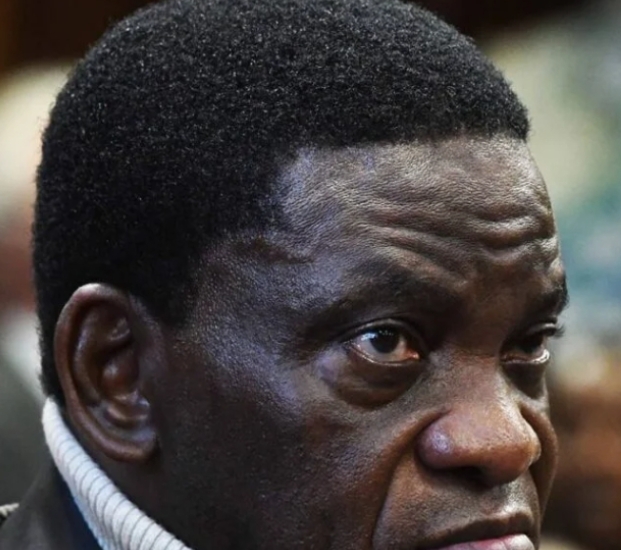News
State Police: Governors To Appoint Police Commissioners, Bill Lists Conditions For CPs Sacking

A bill seeking the amendment of the 1999 Constitution to empower governors to appoint state commissioners of police scaled second reading on the floor of the House of Representatives on Tuesday.
In the alteration to the constitution under consideration, a commissioner of police appointed from among the serving policemen in the state will head the proposed state police in a long-awaited move to decentralise the Nigeria Police Force which has failed to address the spiralling security crisis confronting the country.
The country has been under assault by bandits, kidnappers, and other nefarious characters that daily launch violent attacks on citizens, many of whom are kidnapped, killed, or maimed.
Though the police authorities had initiated various security operations and also deployed more operatives across the country to tackle the insecurity, the crime wave had yet to abate as gunmen operated freely in several urban areas and rural communities.
Titled, ‘A Bill for an Act to alter the Constitution of the Federal Republic of Nigeria, 1999 to Provide for Establishment of State Police and Related Matters,’ the bill, sponsored by the Deputy Speaker of the House, Benjamin Kalu, and 14 others, put the police on the concurrent list.
In the 1999 Constitution, policing is on the exclusive legislative List and therefore, under the direct control of the Federal Government.
Leading the debate on the general principles of the bill, the co-sponsor and member representing Ilorin West/Asa Federal Constituency, Tolani Shagaya noted that the primary purpose of government as enshrined in section 14(2)(b) of the Constitution of the Federal Republic of Nigeria, 1999, is the security and welfare of the citizens.
He added that in the past few years, the nation’s collective security had been greatly challenged, noting that as a result, state police had become inevitable to augment the efforts of the Federal Government to make the country safe for all.
Highlighting some of the key innovations in the proposed alteration bill, he said, “The transfer of police from the exclusive legislative list to the concurrent list, a move that effectively empowers states to have state-controlled policing; the introduction of a comprehensive framework to ensure cohesion as well as accountability and uniform standards between the federal police and state police; the provision of prescribed rigorous safeguards preventing unwarranted interference by the federal police in state police affairs, emphasizing collaboration and intervention only under well-defined circumstances.’’
Shagaya further listed other key provisions of the bill to include the establishment of the state police service commissions as distinct from the Federal Police Service Commission with clearly defined roles and jurisdictions, a re-calibration of the National Police Council to include the chairmen of the state police service commissions, emphasising the collaborative and consultative nature of policing in our federal system.
Other provisions are the recognition of the possible financial challenges that may be faced by state police which would require the Federal Government to provide grants or aid, subject to the approval of the National Assembly, thus ensuring adequate resources for effective policing.
The proposed amendment also provides that the appointment of the state commissioner of police by the governor shall be on the recommendation of the Federal Police Service Commission and the state assembly’s approval.
CP’s removal
However, the CP can be removed by the governor on the recommendation of the Federal Police Service Commission, subject to two-thirds of the state assembly.
Section 215 (4) of the bill provides that, “A state police shall be headed by a commissioner of police who shall be appointed by the governor of the state on the advice of the Federal Police Service Commission from among serving members of the state police subject to confirmation by the state House of Assembly.’’
Section 216 (3) read, “A Commissioner of Police of a state shall only be removed by the governor upon the recommendation of the Federal Police Service Commission praying that he be so removed on the grounds of (a) misconduct in the performance of his official duties (b) breach of policing standards, law, regulation, and code of conduct (c) conviction of any offence involving fraud or dishonesty by a court of law or tribunal and (d) bankruptcy and mental incapacity.’’
It stated that the governor or commissioner under him may give the commissioner of police lawful directive but if considered illegal, the police commissioner may refer the order to the state service commission, which is empowered to take the final decision.
“The governor or such other commissioner of the government of the state as he may authorise on that behalf may give to the commissioner of police such lawful directions concerning the maintenance and securing of public safety and order as he may consider necessary, and the commissioner of police shall comply with those directions or cause them to be complied with.”
Furthermore, the National Assembly shall do certification of the state police service commission bi-annually to make sure it meets national standards.
Section 216 (b) of the bill empowers the state police to bear such arms as may be determined by an Act of the National Assembly.
In all, the proposal contains 18 clauses to alter sections 34, 35, 39, 42, 84, 89 and 129 of the Constitution of the Federal Republic of Nigeria (as altered).
The bill also seeks to alter sections 153, 197, 214, 215, and 216 as well as Chapter IV Part III, Second Schedule, Part II of the Third Schedule, and Part III of the Third Schedule of the Constitution.
Federal police
In the proposed legislation, section 214 of the Constitution (Establishment of Federal and State Police) is altered to distinguish the federal from the state police.
Section 214 (3a) reads, “The federal police shall be responsible for the maintenance of public security, preservation of public order and security of persons and property throughout the federation to the extent provided for under this Act or by an Act of the National Assembly; and
“(b) be responsible the maintenance of public security, preservation of public order and security of persons and property within a State to the extent that the State has power to make laws under this constitution.’’
Subject to the provisions of the constitution, the bill states that the federal police shall not interfere with the operations of any state police or the internal security affairs of any state except to contain serious threats to public order where it is shown that there is a complete breakdown of law and order within a state and the state police are unable to contain the threat.
The federal police can only intervene where the governor requests their intervention to prevent or contain a breakdown of law and order in the state.
Section 216 (1) of the Constitution was also altered to provide the basis for the removal from office of the Inspector General of Police.
Contributing in support of the bill, Ahmed Jaha representing Damboa, Gwoza/Chibok Federal Constituency, Borno State, stated, “It is not the responsibility of the military to help in the maintenance of internal security. They are involved because of the breakdown of our internal security mechanisms.’’
Also speaking, the member representing Ikorodu Federal Constituency, Lagos State, Babajimi Benson, noted that it is the job of the police to maintain law and order.
According to him, “The about 400, 000 policemen we have today cannot effectively cater for the over 200 million Nigerians. If the 36 states of the federation feel they have the funding, they should be allowed to establish state police provided such is not used to perpetrate political ambitions.’’
Other lawmakers who spoke in support of the bill included Aliyu Madaki (Kano) Ademorin Kuye (Lagos) and Bello Kumo (Gombe).
But the member representing Jibia/Kaita Federal Constituency, Sada Soli, expressed misgivings, citing the financial implication of state police at a time when many states were struggling to meet their financial responsibility to their workforce.
Ex-police commissioner
Speaking on the bill, a former Assistant Inspector General of Police, Ali Amodu, stated that while there were fears about the powers being granted to the governors to have control over the state police, it would strengthen the powers of the judiciary, noting that in the end, the citizens would benefit more from giving control of the police to the states.
He noted, “The constitution even provides that they are the Chief Security Officers of their states. If they should have control over the police, the judiciary will be so strengthened that if the governor wants to use the police against his opponents, his opponents will go to court and seek redress.
“My view is that we should not be afraid, we are having a lot of security challenges today, and we should not be afraid of testing this because it is happening in other countries. But of course, it will need an amendment of the Constitution.’’
Endorsing the control of state police by the governors as proposed by the lawmakers, Amodu said any abuse of the police could be addressed by the court.
“Yes, there is no doubt that there are going to be instances of abuse, but this abuse can be taken care of, if we seek redress in court. We have to experiment with this thing. You will see the advantages and disadvantages of anything you want to experiment with.
“But I say in conclusion that the advantages we are going to have from allowing the states to have control of their police, and provide them with equipment, the citizens tend to benefit more,” he said.
In his contribution, a retired Commissioner of Police, Emmanuel Ojukwu said, “State police or no state police, it is a matter of the constitution. Our constitution says that there shall be only one police force.
“If Nigeria wants to have state police, they should amend the constitution and they should go ahead and create the state police. But right now, every state has police of its own but they are not called police by law. That is why we have Amotekun, etc. If we amend the constitution and allow the state to call them by name, such as Kano State Police, etc, no problem.
“Governors already have these avenues working. A good number of them in the state are armed and licensed by the police to hold arms. If all they want is for state police that have been created to begin to have sophisticated weapons, no problem. It is all Nigeria.
“The Federal Police as of now is not as efficient as it should be because the Federal Government that is funding the police is not giving it what it needs. If the states create their police and give it what it needs, there will not be any problem.”
On its part, the Rivers State Government supported the bill on the state police.
The state Commissioner of Information and Communications, Joseph Johnson, in an interview with one of our correspondents on Tuesday, said the bill would strengthen policing and improve security.
He further said the state Governor, Siminalayi Fubara, was privy to the meeting with the President recently when the issue of state Police dominated discussions.
News
R¶pe: S’African agencies hammer judge for acquitting Nigerian pastor

By Kayode Sanni-Arewa
Some South African government agencies have slammed the acquittal of a Nigerian televangelist, Timothy Omotoso, after spending eight years in detention for rape charges.
The South Africa-based Nigerian pastor alongside his co-defendants, Lusanda Sulani and Zukiswa Sitho, was discharged and acquitted of rape, sexual exploitation, and human trafficking by Gqeberha High Court on Wednesday.
Omotoso had been in jail since 2017 awaiting trial, following his arrest at the Chief Dawid Stuurman International Airport.
Delivering the verdict, the presiding judge, Irma Schoeman said Omotoso, the senior pastor of Jesus Dominion International, situated in Durban, was not guilty because his prosecutors had mishandled the case.
Also, the South Africa’s National Prosecuting Authority said, “former prosecutors in the case acted improperly and the accused were not sufficiently cross-examined by the state.”
But notable agencies, including the South Africa’s Justice Committee and the Department of Women, Youth and Persons with Disabilities, slammed the judge for her verdict.
According to South African media, the country’s Justice Department, while reacting on Thursday, slammed Schoeman and the NPA, describing Omotoso’s acquittal as an “assault on the fight against gender-based violence.”
The committee, chaired by Xola Nqola, said the sexagenarian’s freedom “is totally unacceptable”, adding that, “we need the National Prosecuting Authority to explain the weaknesses in the team and the case they presented.”
Similarly, the Department of Women, Youth, and Persons with Disabilities, in a statement, criticised the ruling, adding that it had only created doubt in South Africa’s judicial system.
“The acquittal of Omotoso represents a judicial turning point, one that risks undermining the faith that survivors have in the legal system,” the department stated. “Many women came forward bravely to testify about their horrific experiences, but the ruling will likely compound the emotional toll they have already endured.”
“This case highlights the complexity of gender-based violence and femicide, both of which require urgent, comprehensive, and coordinated action,” the statement continued.
It stated, “The fight against GBV is far from over, and while we respect the outcome of the case, it cannot deter us from our mission to create a safe and just society for women, youth, and persons with disabilities.”
The department concluded that it would not be deterred by this ruling, but, “Instead, it will only strengthen our resolve to work tirelessly for a South Africa that is safe, just, and empowering for all.”
Meanwhile, a political organisation in South Africa, ActionSA, had called for the deportation of the Nigerian cleric following his acquittal.
News
DANGER! Ex-Soldier Abubakar Affan Vows to Kill VeryDarkMan ‘Like Deborah Samuel’

On Friday, Abubakar Affan, whose social media profiles suggest he was a soldier with the Nigerian Army, threatened to kill Martins Vincent Otse, a social media influencer known as VeryDarkMan, if he “commits what Deborah did in Sokoto State”.
On May 12, 2022, Deborah Samuel was publicly stoned and burnt to death by a group of unruly students and Islamic extremists at the Shehu Shagari College of Education over an allegation of blasphemy against Prophet Muhammed (SAW) on a WhatsApp group.
Recently, 16 men identified as northern hunters were burnt alive in Uromi, Edo State. Their deaths caused national outrage and demands for justice.
On Friday, Otse reminded the public about the need for justice to be done in the case of Deborah Samuel in the same vein.
“Arresting and prosecuting the killers of Deborah would bring justice and unity to Nigeria to a large extent. Fish out Deborah’s killers just like the Uromi 16 killers were arrested. I stand for justice,” Otse posted on his X handle.
A screenshot image of Abubakar Affan’s quote in response to Otse’s post.
The social media influencer attached a collage picture of the victim and one of her killers at the scene of the killing to the post.
Nigerians on X engaged the post in hundreds, echoing Otse’s sentiment.
However, Affan quoted the post with a direct threat to the influencer. Affan said he would kill Otse if he did what Deborah Samuel was accused of “today”.
“If, today, you committed what Deborah did in Sokoto, I’ll find you and send you where she’s now,” Affan posted, adding a cartoon depicting different levels of reactions to mob killings in Lagos, Sokoto and Edo. His post is archived here.
Abbakar Affan.
“The hypocrisy of the animal we share country (sic) with. Bunch of gays,” Affan added.
WHAT AFFAN’S DIGITAL FOOTPRINTS SAY ABOUT HIM
The quote has garnered over 411,000 impressions. Curiously, over 1,647 accounts have liked it, suggesting an impressive number of people shared Affan’s extremist sentiment.
A peep into his X profile showed that he spent four years in the northeast with Nigerian troops combating Boko Haram terrorists.
Boko Haram and ISIS terrorists got recruits by twisting and manipulating Islam, Affan said in an article posted by Strike Source, a security news website. The website was unsafe at press time because its secure site lock (SSL) certificate had expired.
“Many of their [ISIS] recruits are Nigerians from neighboring countries that speak Kanuri. They twist the words of the Koran and take advantage of the lack of education. By using a faith as a weapon, they tell them that the military is the enemy because they don’t follow their version of Islam, and that we are pagans,” Strike Source quoted Affan to have said.
On March 19, he shared that he had quit his job in the army.
A screenshot of Affan’s post talking about his military experience in the northeast.
On his LinkedIn profile, he described himself as a former soldier who enlisted in the Nigerian Army in 2012:
“I’m Abubakar Affan, a dedicated and highly skilled special forces officer of the AFS with a passion for counter-terrorism operations and combating extremism. With nearly a decade of experience in the Armed Forces, I take immense pride in serving my country and contributing to the safety and security of the nation.
“I embarked on my journey in the military in 2012, enlisting in the Nigeria Army Armed Forces. My foundational military training at the prestigious Nigeria Army Depot in Zaria laid the groundwork for my subsequent growth as a specialized operative.
“For the past six years, I have been actively deployed in counter-terrorism operations in northern Nigeria, engaging and neutralizing extremist groups with unwavering determination. Throughout the service, I Abubakar has had the honor of being part of various Special Forces units, honing, skills and expertise in tackling complex security challenges.”
News
CBN not happy over debt servicing as FX reserves drop $2bn

Nigeria’s gross foreign exchange reserves fell by $2.57bn from January to March 2025, marking a 6.29 per cent decrease over the three-month period.
This was revealed in external reserves data available on the website of the Central Bank of Nigeria.
Earlier this week, the CBN attributed the decline in the country’s foreign exchange reserves during the first quarter of 2025 to the burden of foreign debt servicing.
On January 2, 2025, Nigeria’s foreign exchange reserves stood at approximately $40.88bn but dropped to $39.72bn by the end of the month.
By the end of February, the reserves fell further to $38.42bn, representing a decline of $1.3bn within one month, equivalent to a 3.27 per cent decrease.
The downward trend continued into March as the reserves dropped to $38.31bn by the end of the month. This represents an additional reduction of $110m, translating to a 0.29 per cent decline compared to the previous month.
The combined month-on-month decreases led to a total quarterly drop of $2.57bn, representing a cumulative decline of 6.29 per cent over the first quarter of 2025.
Despite the strong reserves position at the end of 2024, the first quarter of 2025 witnessed a reversal, primarily driven by the need to service foreign debts.
The CBN noted that the first quarter figures reflected seasonal and transitional adjustments, including significant interest payments on foreign debt.
These obligations have been a consistent pressure point, leading to a drawdown of reserves despite the improvements observed in the preceding quarter.
In a statement, the CBN said, “Reserves have continued to strengthen in 2025. While the first quarter figures reflected some seasonal and transitional adjustments, including significant interest payments on foreign-denominated debt, underlying fundamentals remain intact, and reserves are expected to continue improving over the second quarter of this year.”
Data from the CBN revealed that Nigeria’s total debt service payments amounted to $540m in January 2025 and $276m in February 2025.
This means that a total of $816m was spent on foreign debt servicing in the first two months of the year.
The significant outflow in January was attributed to scheduled foreign debt repayments, creating substantial pressure on the reserves.
The reduction in February’s debt servicing to $276m provided some respite, but high debt obligations continued to weigh on reserve levels.
Despite the decline in the first quarter, the CBN remains optimistic about a rebound in reserve levels as oil production improves and non-oil FX earnings are expected to rise.
The apex bank expressed confidence that improved oil production levels and a more supportive export growth environment would boost non-oil FX earnings and diversify external inflows.
The bank has reiterated its commitment to prudent reserve management, transparent reporting, and macroeconomic policies that aim to stabilise the naira, attract investment, and build long-term economic resilience.
-

 News18 hours ago
News18 hours agoSecurity Alert: Police alert officers ahead of nationwide protest over living costs, free speech
-

 News16 hours ago
News16 hours agoVOA Halts Operations In Nigeria, Others Over President Trump
-

 News6 hours ago
News6 hours agoWhy NYSC maybe extended by FG- Minister
-

 Politics2 hours ago
Politics2 hours agoTinubu Gives Fani Kayode, Others New Appointments (See Full List)
-

 News16 hours ago
News16 hours agoPolice rescue 14 kidnapped passengers of Benue Links
-

 Metro6 hours ago
Metro6 hours agoHow I was robbed of N15.5 million by my girlfriend, her brother, and a group of cultists
-

 News2 hours ago
News2 hours agoDANGER! Ex-Soldier Abubakar Affan Vows to Kill VeryDarkMan ‘Like Deborah Samuel’
-

 Economy6 hours ago
Economy6 hours agoCBN allocates $197.71m into FX market to support naira




